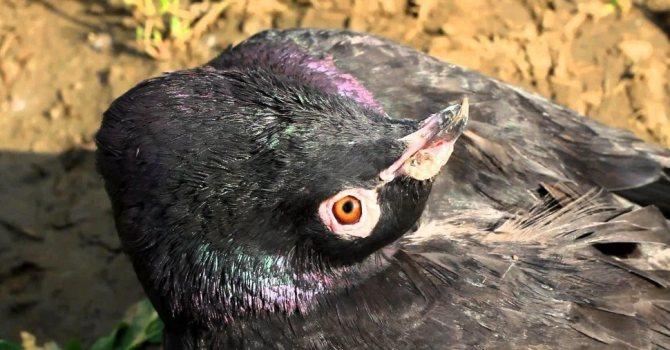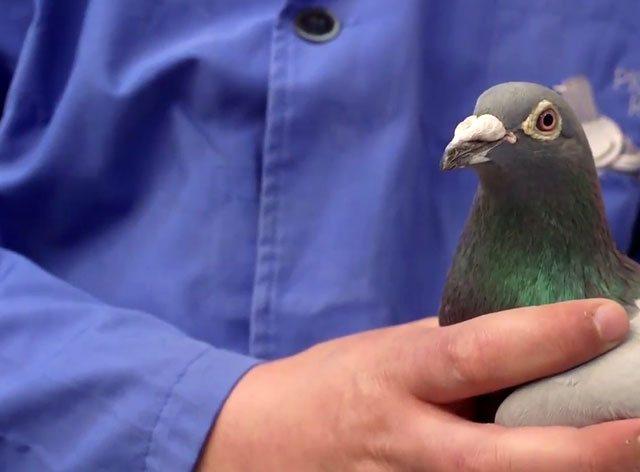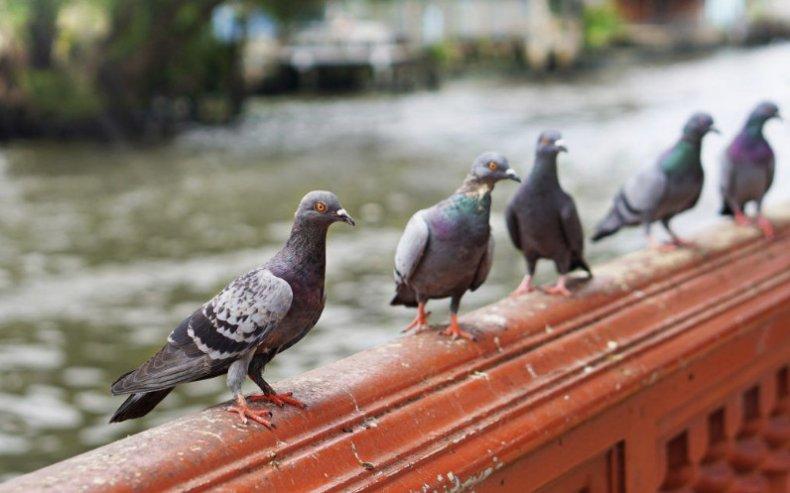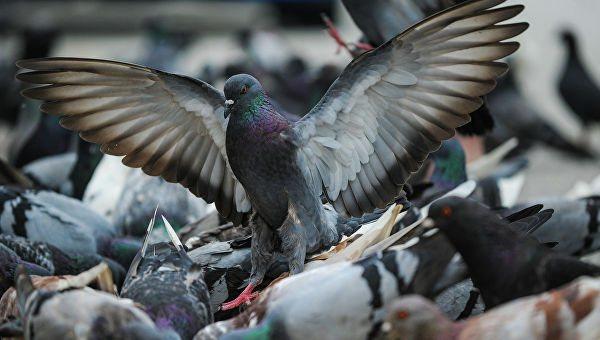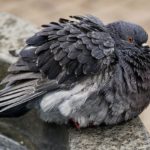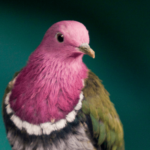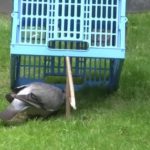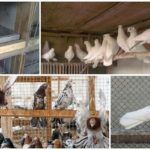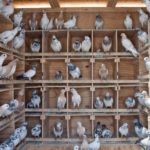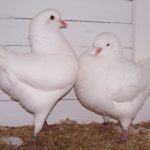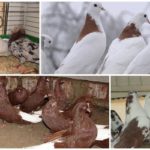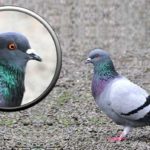Wheezing in pigeons can be a sign of infectious diseases, in any case, this symptom should be paid attention to. Let's look at some contagious diseases of birds, their main symptoms and possible treatment, how many days it can take for pigeons to go away wheezing, as well as a set of preventive measures that will help prevent pets from becoming infected at home.
Why do pigeons wheeze and how to treat them?
Wheezing is a sign of damage to the respiratory system, so you need to look for the cause in respiratory diseases.However, the infection is not always localized only in the respiratory tract; the infection can affect other organs and the entire body.
Rhinitis
An infectious runny nose can be caused by hypothermia; birds can become infected from sick relatives, through contaminated food, water, and bedding. A sign of rhinitis in pigeons is a mucous fluid secreted from the nostrils, first transparent, then greenish-gray. Sometimes crusts form on the nostrils, which interfere with normal breathing. Without treatment, rhinitis can last a long time – up to 2 months.
Laryngotracheitis
The source of infection is sick and also recovered virus-carrying pigeons. Pathogens are transmitted through food and water, bedding and equipment. The infection penetrates primarily through the nasal passages, trachea and conjunctiva. Infection is promoted by indoor humidity, overcrowding, and poor feeding. The acute course is characterized by depression, refusal to eat, heavy breathing, wheezing, and lacrimation. Treatment of laryngotracheitis is carried out with the help of antibiotics (ampicillin, erythromycin, tetracycline) and drugs that alleviate symptoms (rinsing the nose with a solution of boric acid, potassium permanganate). It lasts a week.
Trichomoniasis
Trichomonas enter the body of pigeons with water; chicks become infected when fed by adults. Infection is facilitated by eating low-quality or rough food, which injures the mucous membranes; the pathogen enters the body through wounds. The pharynx, mouth and esophagus are affected; yellow, dense growths form on them, making swallowing and breathing difficult.This is what causes wheezing.
For treatment, use the antibiotic “Metronidazole” for 5 days or special preparations Cocci-Tricho, Orisept, Siegertauben Anti-gelb, Tricho 40, Cocci-Tricho Tab.
Aspergillosis
Fungal disease; pathogens can be in food, bedding, nests, or on the surface of walls. They are resistant to disinfectants and can be destroyed by fire treatment. The disease develops in dirty and damp rooms, with crowded conditions. Aspergillosis affects the respiratory system, as well as the cardiovascular system. Birds experience wheezing, coughing, shortness of breath, and heart rhythm disturbances. If the nervous system is damaged, death can occur.
To treat aspergillosis, potassium iodide is given at a dose of 0.15-0.3 mg per head. Additionally, you can give your pets Nystatin at a dose of 400 thousand units. per 1 kg for 7-10 days with food, “Intraconazole”, “5-Phlorocytosine”, “Amphotericin B”, “Mycoplazol”. Prevention requires preventive measures.
Avian tuberculosis
Infection of birds with tuberculosis is facilitated by dampness, keeping them in a dark room, and poor feeding. Pathogens spread from sick pigeons to healthy ones through bedding, food, equipment, and water. Treatment of tuberculosis is carried out with a combination of drugs: Isoniazid (30 mg/kg), Ethambutol (30 mg/kg), Rifampicin (45 mg/kg). Or a mixture of Pyrazinamide, Ioniazid, Streptomycin, Rifampicin. In case of bacterial carriage, give Rifampicin and Isoniazid for 3-4 months every day or every other day.
Pigeon psittacosis
The infection affects the nervous system, lungs, is manifested by fever, intoxication, and the spleen and liver become enlarged. Pigeons develop pneumonia, sneezing, runny nose and wheezing.The disease can occur latently, without obvious symptoms.
Therapy for psittacosis is long-term, it may take 2-3 months, specific antibiotics Orni Injection and Orni Cure, and vitamins A, E, D3 are required. Without treatment, the disease becomes chronic, the bird is constantly depressed, its activity and productivity decrease.
Diphtheria pox
Signs of skin pox are growths on the beak, near the eyes, and they may also be inside the throat. At the same time, breathing and eating become difficult, and the pigeons begin to wheeze. The disease spreads when there is high humidity in the room, if there are drafts, or when it gets cold. Sources of infection are water, feed, dirty bedding, contaminated equipment. Recovered pigeons remain carriers for 1-2 months.
Treatment: antiviral agents (Acyclovir) and vitamin complexes, treatment of growths with tetracycline ointment. In advanced cases, the bird is slaughtered.
Newcastle disease or whirligig
Signs of the disease: lethargy, loss of appetite, damage to the respiratory organs, suffocation, wheezing, diarrhea, mucus discharge from the nostrils, conjunctivitis. There is no specific therapy for Newcastle disease; it can be prevented by preventive measures and vaccination of 1-month-old birds with Colombovac PMV. Immunity is formed for 1 year.
Prevention measures
Infections in pigeon populations are more likely to spread where the birds are located and forced to live in unfavorable conditions. For example, if they are kept on dirty, damp bedding that does not change for a long time, if it is cold and damp in the poultry house in winter. Insufficient or poor nutrition matters. This weakens the bird's body, which has poor resistance to pathogens.
The likelihood of diseases can be reduced by regularly maintaining the cleanliness of bedding, perches, nests, and equipment.Feed pigeons a variety of foods from which they can obtain nutrients, vitamins, and mineral salts.
During the season of infection spread, premises should be disinfected and birds should be vaccinated. When purchasing new ones, send them to quarantine; remove sick ones immediately and keep them separately during treatment. If the development of the disease is in an advanced stage, send such pigeons for slaughter.
Wheezing in pigeons is a symptom indicating an infectious disease. Often other signs can be noticed: runny nose, depression, decreased activity, dysfunction of the gastrointestinal tract. A sick bird needs timely treatment with antibiotics or antiviral drugs. You can cure pigeons yourself if you know exactly what they are sick with, but it is better to consult a veterinarian.

